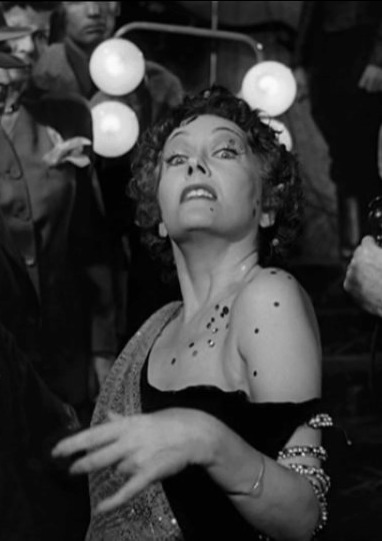A friend and I recently went to a special screening of Sunset Boulevard in Dallas and, as all
of our outings together end after viewing classic films, we discussed the
merits of the Billy Wilder movie on the drive home. One such topic for this film noir/black
comedy was the Oscar nominated role of Norma Desmond, played by Gloria Swanson.
 Much like the Sunset Boulevard
character, Swanson was a silent film star who did not successfully make the
transition over to “talkies.” In the
beginning Swanson had mild success in talking features, however, unlike Desmond
she bowed out gracefully from Hollywood, withdrawing permanently to New York City
in 1938. Among her activities while in
New York were painting, sculpting, writing a syndicated column, engaging in
political activism, designing clothing and accessories, marketing, and radio
and television work. She also started an
effective enterprise that during World War II was able to liberate Jewish
scientists from war-torn Europe, resulting in the creation of a few valuable
inventions.
Much like the Sunset Boulevard
character, Swanson was a silent film star who did not successfully make the
transition over to “talkies.” In the
beginning Swanson had mild success in talking features, however, unlike Desmond
she bowed out gracefully from Hollywood, withdrawing permanently to New York City
in 1938. Among her activities while in
New York were painting, sculpting, writing a syndicated column, engaging in
political activism, designing clothing and accessories, marketing, and radio
and television work. She also started an
effective enterprise that during World War II was able to liberate Jewish
scientists from war-torn Europe, resulting in the creation of a few valuable
inventions.
Following several refusals from other “has-been” actresses,
Wilder approached Swanson for the role of Norma Desmond, a faded and delusional
Hollywood actress hoping to mount a comeback with a picture she has written
herself. Desmond elicits the help of a
young screenwriter, played by William Holden, with the two eventually becoming
romantically involved. Swanson’s similar
background to draw from for the role surely helped with the creation of the
irrational Norma Desmond, and with the aid of several legendary quotes that are
still known today it is no wonder an Academy Award nomination was bestowed to
Swanson. After watching her performance
again it was mindboggling how she did not win the Oscar that year. I said multiple times that it was
inconceivable as to how she was passed up that year, but then I actually looked
at the other nominees and realized why.
1950 was a tough year to be nominated for an Academy Award
in the Best Actress category. First of
all, Bette Davis was involved for her role in All About Eve. Davis was the
Meryl Streep of her time, or I guess it should be Streep is the Davis of
now. If Davis was in it, there was a
good chance she was getting nominated.
In all, Davis received 10 nominations for Best Actress, with another
honorary nomination that is not recognized by the Academy, and two wins. Being up against Bette Davis was hard enough
for Swanson to overcome, but Davis’s costar inadvertently helped Swanson’s case.
Another Best Actress nomination came from All About Eve for Anne Baxter. It is generally accepted Davis and Baxter
negated one another’s votes, resulting in the other three nominees receiving
better odds of winning the golden statue.
Baxter was an adequate starlet to the say the least, with the latter
days being spent making appearances on popular television series of the 1960s,
70s, and 80s. It is safe to say the
highlight of her career was the Best Supporting Actress Oscar she received for The Razor’s Edge in 1946.
With Davis and Baxter cancelling one another out, Judy
Holliday ultimately went home a winner for Born
Yesterday. Holliday carried over the
success she had in the role as Billie Dawn from stage to screen, not only
winning an Oscar, but also the first Golden Globe for Best Actress – Motion Picture
Musical or Comedy. Holliday is
ultimately known for her work on the Broadway stage, but besting Bette Davis,
Anne Baxter, and Gloria Swanson in the Oscar race of 1950 is certainly a fine
feather in her cap.
That leaves Eleanor Parker’s performance in Caged.
I’ve never seen the movie, so I really can’t evaluate her much. Her filmography includes a role in The Sound of Music, The Man with the Golden Arm, three Oscar nominations for Best
Actress, and a Volpi Cup for Best Actress at the Venice Film Festival.
Even without a good knowledge of Parker’s role or how she
did with it, I feel comfortable stating that 1950 was one of the tightest races
ever for the Best Actress category. A
little over a week ago I couldn’t fathom Swanson not winning the award, but now
I see what she was contending against.
It was really a tough race to win.



